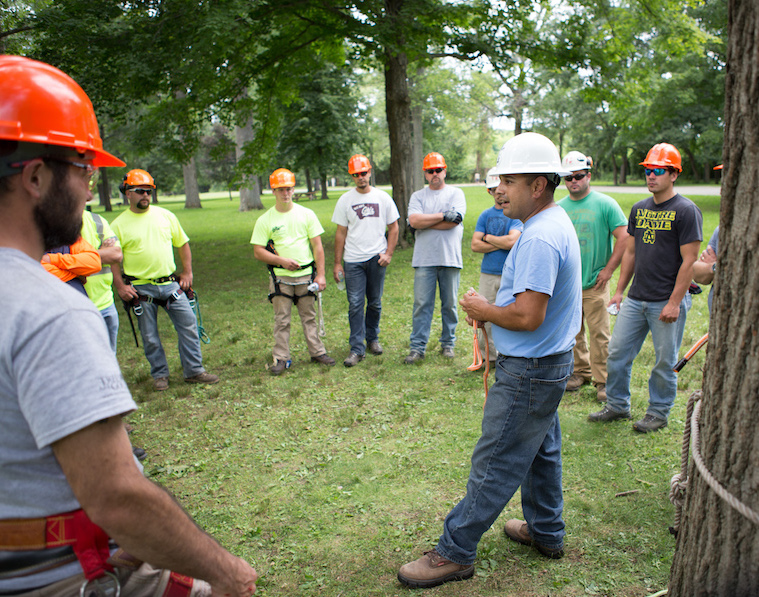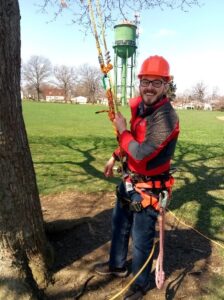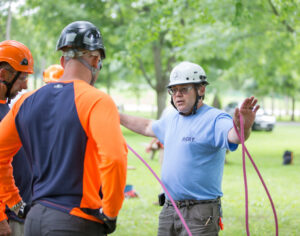Instructors Make the Training: Why Face-to-Face Education Matters

By Alex Subak
As the school director for ACRT Arborist Training, I spend my time setting training schedules for our instructors and clients, grading tests and videos sent in for certification, and working to refine our curriculum so it offers a good value for a modern tree worker. Being largely confined to my desk in a typical corporate office, I sometimes lose the bigger picture of what we do as a department – at least in the field. When I first started, I think some of the instructors took a secret pleasure in watching one of the office guys get out there in gear and climb trees (poorly, I might add). My climbing experience is limited to a rock wall at Kent State University, so it was no surprise that I snarled the rope in the foot ascender and got stuck. But it was a teachable moment, and I was sitting in the tree, fully sure that I would be stuck forever and die of starvation eight feet off the ground, I had an epiphany: this was not an experience I could have had online.
To provide a little backstory, my previous job was as a teacher and course designer for an online school. Although I have worked in brick-and-mortar classrooms and online, my expertise is the online model. Surveys generally indicate that enrollment in online education programs is growing, and will continue to do so. From my personal experience as a high school teacher, the enrollment grew by the thousands every year. As students start to experience online education more in their youth, it will be an easy transition to taking online classes as they enter college or trade schools. But there are some things you can’t learn online, and climbing is one of those things.
 There are a slew of materials that allow prospective arborists to learn the things they need to know from the comfort of their own home. Many study guides offer a DVD of sample work in practice, and online tutorials on how to tie a knot or climb a tree can be found all over the internet. Our own department even offers these kinds of videos and this kind of learning. However, from a safety standpoint, from an authentic learning standpoint, and from an experiential standpoint, there is just no substitute from having an expert teaching you the ropes – literally.
There are a slew of materials that allow prospective arborists to learn the things they need to know from the comfort of their own home. Many study guides offer a DVD of sample work in practice, and online tutorials on how to tie a knot or climb a tree can be found all over the internet. Our own department even offers these kinds of videos and this kind of learning. However, from a safety standpoint, from an authentic learning standpoint, and from an experiential standpoint, there is just no substitute from having an expert teaching you the ropes – literally.
Although online learning is economical and convenient, there is no substitute for the human connection that people share in society. From my perspective in building-based versus online-based learning, the overall grades and mastery of class material support the assertion that students still learn best in person. While I will let smarter people than myself dig into the psychology of humans as social creatures, in the arboriculture industry, by the very nature of the physical work and risk involved, you can’t just have an online model to disseminate knowledge and have an employee be ready to climb a tree or clear power lines. When virtual reality is perfected, and we can’t distinguish reality from our virtual environment, maybe then we will be ready for this type of learning and teaching – but that time is not here yet.
 As an arborist trains throughout his or her career, he or she will learn the tools and tricks of the trade from coworkers and experts in the field. Our instructors – if I may brag for a moment – are the experts in the field. We have a manager of the whole department who has been in the industry more than 25 years, and all the instructors have either degrees or heavy industry experience. When they teach their training classes – whether it is a Basic or Advanced class, a Line Clearance class or Electrical Hazard training – they are the experts in the room. They are, of course, open to discussion, but they are the source of knowledge with the skill to impart that collected wisdom to their students. I have to believe that they would be effective online, as well because they are so accomplished in their careers, but it would be such a limited effectiveness in a sense – an incomplete product.
As an arborist trains throughout his or her career, he or she will learn the tools and tricks of the trade from coworkers and experts in the field. Our instructors – if I may brag for a moment – are the experts in the field. We have a manager of the whole department who has been in the industry more than 25 years, and all the instructors have either degrees or heavy industry experience. When they teach their training classes – whether it is a Basic or Advanced class, a Line Clearance class or Electrical Hazard training – they are the experts in the room. They are, of course, open to discussion, but they are the source of knowledge with the skill to impart that collected wisdom to their students. I have to believe that they would be effective online, as well because they are so accomplished in their careers, but it would be such a limited effectiveness in a sense – an incomplete product.
When you as a company commit to training your employees – to keep them safe and aid in their learning – you are buying a product. The instructors are that real-world product; something the students in their classes can question and learn from. After all, each student comes to the class with a different set of skills – as the theory of multiple intelligences would suggest – and all learn in an individually unique way. What maybe works for an employee who was raised on electronic devices may not work for the employee who prefers to engage their mind and body in a kinetic pursuit of knowledge.
Online learning will become more important. We only have to look at the growth of the digital world during the last three decades to see that. Until that paradigm shift occurs – and we become creatures that learn individually – there is a need for physical teachers in a classroom and in the field, especially in the arboriculture industry. I hear from companies that say training is a costly proposition, what with the time off from work and the cost of the classes themselves, but almost all say it is worth it in the end. From having experts teach employees to learning to work safety and to the ability of instructors to approach all students in a unique way, instructors make the training in today’s world, and will continue to do so for some time.
Alex Subak is school director, ACRT Arborist Training. Subak finished his Bachelor of Arts degrees in English and History from Kent State University in 2008, and he later completed his Masters of Arts in Teaching (MAT) and received his teaching certificate. Knowing how information is and will be transmitted, he took a teaching position at an online school and taught there for 6 years. Subak has been with the Arborist Training department of ACRT for a year, and looks forward to being instrumental in the conversations about how training is delivered in the modern corporate environment, and how adults can be best guided to complete their work safely and effectively.


